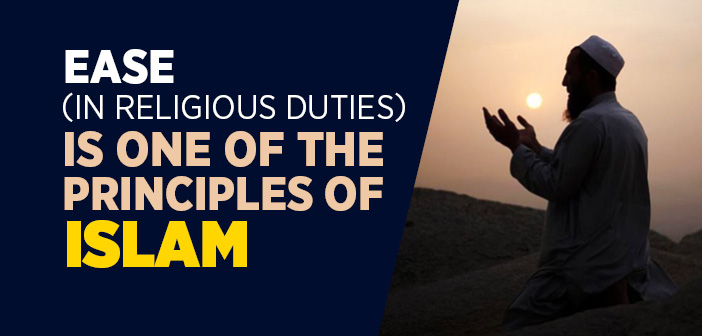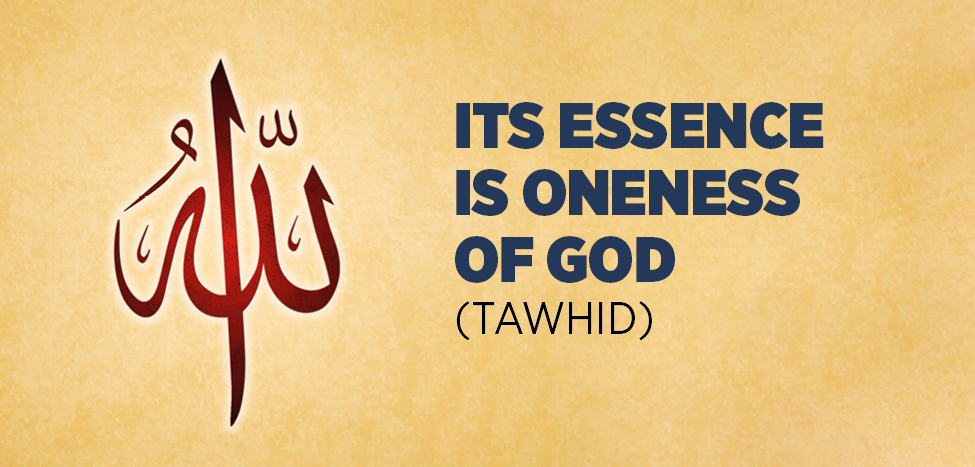What are the principal religious duties in islam? What are the duites of muslims?
Our endlessly merciful Lord has always wished ease for His subjects and made every aspect of Islam easy. In noble verses of the Quran it is stated:
“On no soul does Allah place a burden greater than it can bear.” (Al-Baqara (The Cow), 2:285)
“Allah intends every facility for you; He does not want to put you to difficulties.” Al-Baqara (The Cow), 2:185)
“He has chosen you, and has imposed no difficulties on you in religion.” (Al-Hajj (The Pilgrimage), 22:78)
“Allah does wish to lighten your (difficulties): For man was created weak.” (An-Nisa` (Women), 4:28)
The Messenger of Allah (blessings and peace be upon him) describes one of the principles of ease in Islam as follows:
“God Almighty commands His angels as follows: ‘If My subject wishes to do a bad deed, do not record it until he actually does it. When he does it, record it as one sin against him. If he gives it up for My sake, then record it as a divine reward in his favor. If My subject wishes to do a good deed, record for him a reward even if he does not do it. If he goes ahead and does the good deed, then record for him rewards starting from at least ten times up to seven hundred times.’” (Bukhârî, Tevhîd, 35; Muslim, Îmân, 203, 205)
The noble companions report that the Messenger of God (blessings and peace be upon him) was a kind man who was easy to get along with and who always made things easy for others.[1]
Let’s give some examples that show Islam is a religion of ease:
- Man is responsible for the things in his power and his capabilities. Nothing he can’t do is asked from him, and he will not be held accountable for things that were inevitable or things outside his power.
- In Islam, the gradual approach is essential. Sins such as drinking alcohol, engaging in interest, and fornication were all prohibited slowly in three to four stages.
- It is obligatory to make ablution with water before performing the ritual prayer. However, making ablution with clean soil (tayammum) is allowed when water cannot be found or when water is too cold and there is the likelihood of getting sick.
- Travelers are allowed to reduce the original four units of obligatory prayers by shortening them to two units due to the possibilities of tiredness and lack of time.
- It is obligatory to stand in prayer (kiyaam). However, those who do not have the capability of standing can pray instead, according to their situations, by sitting, lying down, or just signalling with the eyes.
- There is no need for a special place to worship. One can worship anywhere that is clean. The Messenger of Allah (blessings and peace be upon him) said:
“All the earth has been granted to me as a clean place of worship, therefore a believer from my nation should pray right away when the prayer time enters, wherever he is.” (Bukhari, Tayammum,1)
- Fasting may prove difficult for those who are ill or for travelers who may be harmed by it. For this reason, they are left free in the matter of fasting in Ramadan. If they do not fast, they make it up when they recover or when they return from the trip.
- If there is a security concern in the route to Hajj (the Pilgrimage) due to contagious illness or war etc. Muslims on whom performing the Hajj has become obligatory may delay it until the threat subsides.
As our master the Prophet said, “Praise be to Allah who granted ease in religion!” (Ahmad Ibn Hanbal, VI, 167).
[1] Muslim, Hajj, 137.
Source: Dr. Murat Kaya,The Final Divine Religion: ISLAM





